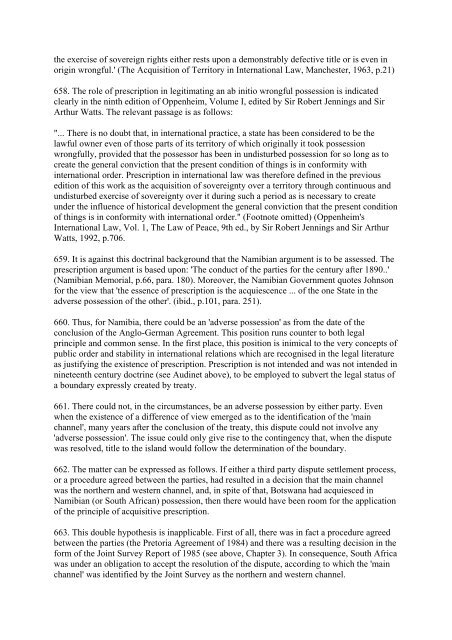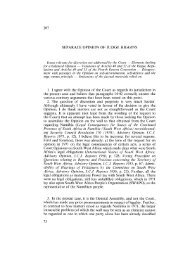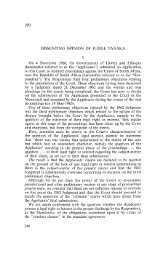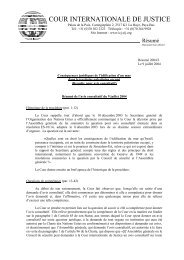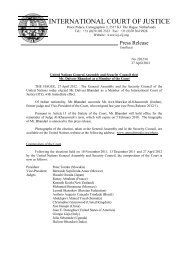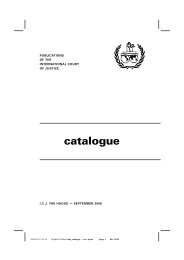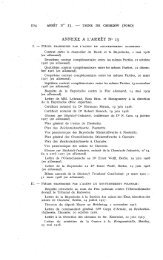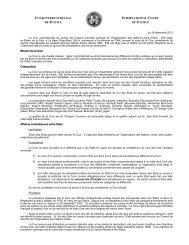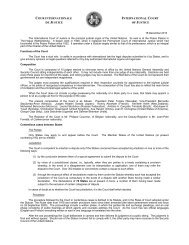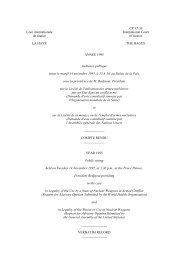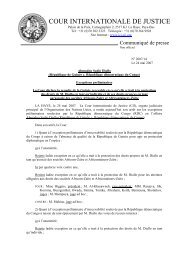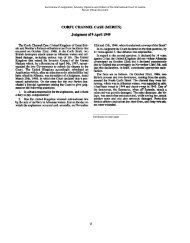botswana/namibia - Cour international de Justice
botswana/namibia - Cour international de Justice
botswana/namibia - Cour international de Justice
You also want an ePaper? Increase the reach of your titles
YUMPU automatically turns print PDFs into web optimized ePapers that Google loves.
the exercise of sovereign rights either rests upon a <strong>de</strong>monstrably <strong>de</strong>fective title or is even in<br />
origin wrongful.' (The Acquisition of Territory in International Law, Manchester, 1963, p.21)<br />
658. The role of prescription in legitimating an ab initio wrongful possession is indicated<br />
clearly in the ninth edition of Oppenheim, Volume I, edited by Sir Robert Jennings and Sir<br />
Arthur Watts. The relevant passage is as follows:<br />
"... There is no doubt that, in <strong>international</strong> practice, a state has been consi<strong>de</strong>red to be the<br />
lawful owner even of those parts of its territory of which originally it took possession<br />
wrongfully, provi<strong>de</strong>d that the possessor has been in undisturbed possession for so long as to<br />
create the general conviction that the present condition of things is in conformity with<br />
<strong>international</strong> or<strong>de</strong>r. Prescription in <strong>international</strong> law was therefore <strong>de</strong>fined in the previous<br />
edition of this work as the acquisition of sovereignty over a territory through continuous and<br />
undisturbed exercise of sovereignty over it during such a period as is necessary to create<br />
un<strong>de</strong>r the influence of historical <strong>de</strong>velopment the general conviction that the present condition<br />
of things is in conformity with <strong>international</strong> or<strong>de</strong>r." (Footnote omitted) (Oppenheim's<br />
International Law, Vol. 1, The Law of Peace, 9th ed., by Sir Robert Jennings and Sir Arthur<br />
Watts, 1992, p.706.<br />
659. It is against this doctrinal background that the Namibian argument is to be assessed. The<br />
prescription argument is based upon: 'The conduct of the parties for the century after 1890..'<br />
(Namibian Memorial, p.66, para. 180). Moreover, the Namibian Government quotes Johnson<br />
for the view that 'the essence of prescription is the acquiescence ... of the one State in the<br />
adverse possession of the other'. (ibid., p.101, para. 251).<br />
660. Thus, for Namibia, there could be an 'adverse possession' as from the date of the<br />
conclusion of the Anglo-German Agreement. This position runs counter to both legal<br />
principle and common sense. In the first place, this position is inimical to the very concepts of<br />
public or<strong>de</strong>r and stability in <strong>international</strong> relations which are recognised in the legal literature<br />
as justifying the existence of prescription. Prescription is not inten<strong>de</strong>d and was not inten<strong>de</strong>d in<br />
nineteenth century doctrine (see Audinet above), to be employed to subvert the legal status of<br />
a boundary expressly created by treaty.<br />
661. There could not, in the circumstances, be an adverse possession by either party. Even<br />
when the existence of a difference of view emerged as to the i<strong>de</strong>ntification of the 'main<br />
channel', many years after the conclusion of the treaty, this dispute could not involve any<br />
'adverse possession'. The issue could only give rise to the contingency that, when the dispute<br />
was resolved, title to the island would follow the <strong>de</strong>termination of the boundary.<br />
662. The matter can be expressed as follows. If either a third party dispute settlement process,<br />
or a procedure agreed between the parties, had resulted in a <strong>de</strong>cision that the main channel<br />
was the northern and western channel, and, in spite of that, Botswana had acquiesced in<br />
Namibian (or South African) possession, then there would have been room for the application<br />
of the principle of acquisitive prescription.<br />
663. This double hypothesis is inapplicable. First of all, there was in fact a procedure agreed<br />
between the parties (the Pretoria Agreement of 1984) and there was a resulting <strong>de</strong>cision in the<br />
form of the Joint Survey Report of 1985 (see above, Chapter 3). In consequence, South Africa<br />
was un<strong>de</strong>r an obligation to accept the resolution of the dispute, according to which the 'main<br />
channel' was i<strong>de</strong>ntified by the Joint Survey as the northern and western channel.


